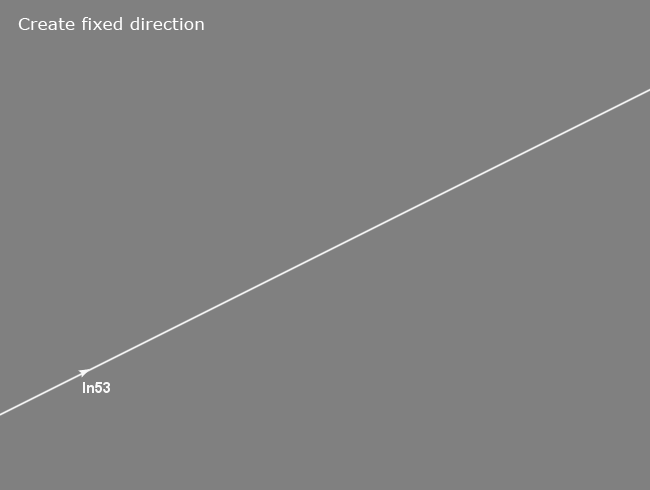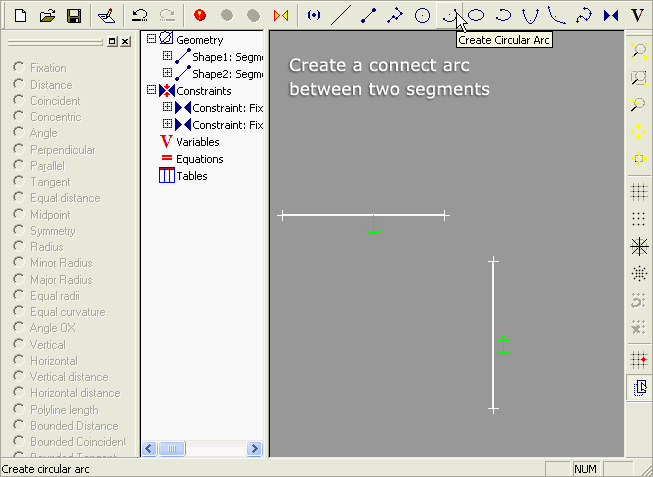Patterns, directed distances, and orientation/alignment attributes help users of CAD/CAM/CAE applications to fully control constrained drawings
LEDAS Ltd., the independent provider of constraint-based design tools, component technologies, and software development services for the CAD/CAM/CAE/PLM market, today announced version 4.0 of LGS 2D, its geometric constraint solver. As a core component of parametric drawing applications, LGS 2D allows users to express design intent through geometric and dimensional constraints applied to elements of sketches and drawings.
New Features in LGS 2D 4.0
Version 4.0 of LGS 2D introduces the following new functions: linear pattern constraints, directed distance constraints, and alignment/orientation attributes for most constraints.
Linear pattern constraints set relations between several sub-geometries of equal shapes (e.g. rectangles), aligning and uniformly distributing them along a given direction. Any changes in position or orientation of any one of the pattern constraint’s arguments leads to corresponding changes in other arguments. As with other LGS 2D constraints, a linear pattern constraint is variational, which means it can be combined with other constraints that are imposed on pattern’s sub-geometries. All constraints are solved simultaneously.

Directed distance is a new constraint that generalizes horizontal and vertical distance constraints introduced in previous versions of LGS 2D. It is a ternary (three-element) constraint imposed on any pair of objects (points, circles, or curves) and a line that represents the direction of distance measurement. It can be used to prevent segments from flipping their end points; using a signed, directed distance constraint (instead of the ordinary distance) fixes the desired relative locations of the end points.
Alignment attributes specify whether the tangent vectors of the constraint arguments are co-directed (collinear vectors with positive scalar product) or counter-directed (collinear vectors with negative scalar product). The attribute can be applied to any constraint involving two non-point entities: tangency, distance, parallelism, or perpendicularity between lines, circles, curves or ellipses.
Orientation attributes control whether an argument is positioned to the left or right side of other ones. They are applied to all distance constraints, except point-point distances. Orientation and alignment attributes fully control the chirality (left or right handedness) of constraints.

For developers, LEDAS provides special integration facilities that simplify the job of embedding LGS 2D into their applications. In particular, all members of Open Design Alliance can use the LGS 2D integration module (developed jointly by LEDAS and the ODA) to quickly implement constraint drawing functions that are fully compatible with the DWG file format. The ODA is a non-profit organization that develops the Teigha™ (formerly DWGdirect) software development platform for CAD and other technical graphics applications.
“The new functions in version 4 were ones requested by our customers,” said Dmitry Ushakov, Director of Product Management at LEDAS. “Our customers’ satisfaction with our products is the greatest recognition we can receive. We appreciate their feedback on our components so that we can continue to improve them.”
About LGS Software
Since their first commercial release in 2004, the LGS 2D/3D software components have been licensed by a dozen CAD/CAM/CAE vendors, who have embedded them into their applications successfully.
The LGS 2D and 3D geometric constraint solvers are used as parametric engines for 2D sketching and drawing, history-free 3D modeling, assembly design, motion analysis, and other applications. LGS 2D/3D are cross-platform software packages running on 32- and 64-bit versions of Windows, Linux, Mac OS X, *BSD, AIX, HP-UX, and other operating systems. LGS 2D/3D have a C-style API for easy integration into a broad range of software applications using a variety of wrappers, such as .NET, Java, and C++.
LGS 2D/3D supports the creation and modification of geometric models by means of explicit and implicit constraints. Geometric objects that can be constrained include points, lines, circles, ellipses, planes, cylinders, spheres, NURBS, and application-defined parametric curves, and surfaces. Objects can be fixed in the absolute coordinate system or relative to each other. Supported constraints include geometric relations between objects (coincidence, parallelism, tangency, and so on) and dimensions that specify the required values for distances, angles, and radii. LGS 2D/3D moves and rotates objects to positions that satisfy all constraints, yet minimizes transformations from initial configurations.
Other LGS functions implement advanced features of CAD/CAM/CAE systems, such as diagnostics of over- and under-defined parts of models, engineering variables and equations, help points, and tolerance management.
Example applications called “Lege’n’d 2D/3D” are available as free downloads from the LEDAS web site. Provided with a collection of sample models representing different kinds of 2D sketches and 3D assemblies, the applications can be used to test the functionality, robustness, and performance of LGS 2D/3D. The sample applications were created with the Open CASCADE open-source application framework; the source code is available to all licensees.
To learn more about LGS 2D/3D, visit the LEDAS Web site at www.ledas.com/products/lgs2d
About LEDAS
LEDAS Ltd. is an independent software development company founded in 1999. It is based in the Novosibirsk Scientific Centre of the Siberian Branch of the Russian Academy of Science. A leader in constraint-based technologies, LEDAS is a well-known provider of computational software components for PLM (Product Lifecycle Management) solutions: geometric constraint solvers for CAD/CAM/CAE, optimization engines for project management, work scheduling, and meeting planning, as well as interval technologies for knowledge-based engineering and collaborative design. The company also provides comprehensive services for PLM markets, including custom software development and consulting. More information about LEDAS is available at www.ledas.com
LGS is a trademark of LEDAS Ltd. Any other trademarks are the property of their respective owners.
Press Contact
LEDAS Marketing Departmentphone: +7 383 3356 504 / fax: +7 383 3356 256
e-mail: info@ledas.com
www.ledas.com